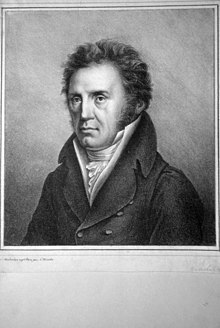Aloys Weissenbach
Aloys Weißenbach (often also Alois Weißenbach or Weissenbach ; born March 1, 1766 in Telfs , † October 26, 1821 in Salzburg ) was an Austrian physician and poet .
Life
Weißenbach was the son of a peasant couple . He received his first education in the monasteries of his homeland and then attended the Innsbruck high school . He completed his surgical studies at the Joseph Academy in Vienna until 1788. He then joined the imperial army and served in the Turkish war and in the campaigns against France . In doing so, he finally rose to become a kk senior field doctor.
In 1804 he received the chair for theoretical and practical surgery and veterinary medicine at the newly established medical faculty of the University of Salzburg . He also became director of the surgical clinic at St. Johanns Spital and received the title of Medical Councilor. He also became the first and last dean of the faculty. In addition, he held private lectures on ophthalmology and worked as a voluntary vaccination doctor for smallpox protection. When the medical school was converted into a major surgical degree in 1807, he retained his position. In 1810 Salzburg fell to Bavaria , which converted the surgical studies into a rural medical school. Weißenbach became professor of zoonomy, anthropology, theoretical and practical surgery and director of the school.
Weißenbach was appointed head of the Salzburg Johannsspital in 1812 and was appointed imperial councilor in 1816 after Salzburg returned to Austria . He was also in Vienna for the Congress of Vienna . When, in 1818, a surgical training institute returned to the country medical school, he became a lecturer in surgery there. He was also a member of the board of the Salzburg association "Museum".
Ludwig van Beethoven's cantata The Glorious Moment , composed in 1814, was set to music. His extensive poetry, mostly written in hexameters, "Aigen, Description and Poetry", which he wrote for his friend and lord of the castle Ernst Fürst Schwerzenberg in 1817, was read by countless spa guests at the Bitterquelle zu Aigen. The Dr. Aloys-Weißenbach-Hauptschule in Telfs is named after him.
Works (selection)
- Seals
- Thanks to Tyrol , Gastler, Vienna 1799.
- A tribute. Dramatic prologue. Presented at the Imperial and Imperial Royal National Theater in Salzburg on March 17, 1806 , Zaunrieth, Salzburg 1806.
- The bridal wreath. Tragedy in 5 Acts , Wallishausser, Vienna 1810.
- The Barmecids or the Egyptians in Baghdad. Play in 5 acts , Wallishausser, Vienna 1811.
- The holy moment , Mayr, Salzburg 1814.
- Teutonia: A memorial of the past and paperback of modern times , Strauss, Vienna 1815.
- My trip to the Congress. Truth and Poetry , Wallishausser, Vienna 1816.
- Scientific publications
- About Theophrastus Paracelsus von Hohenheim , Salzburg 1804.
- Biographical sketch by J. Joh. Hartenkeil. Dr. der Arzeneiwissenschaft ... and Protomedicus in Salzburg , Salzburg 1808.
- The opening of the St. Johannesspital in Salzburg in 1696 , Mayr, Salzburg 1818.
literature
- Constantin von Wurzbach : Weißenbach, Alois . In: Biographisches Lexikon des Kaiserthums Oesterreich . 54th part. Imperial and Royal Court and State Printing Office, Vienna 1886, pp. 167–172 ( digitized version ).
- Julius Pagel : Weissenbach, Alois . In: Allgemeine Deutsche Biographie (ADB). Volume 41, Duncker & Humblot, Leipzig 1896, p. 601.
- Christoph Weißer: Surgeon Lexicon: 2000 personalities from the history of surgery , Springer 2019, ISBN 978-3-662-59238-0 , p. 343.
Web links
- Works by and about Aloys Weißenbach in the German Digital Library
- Aloys Weißenbach in the digital portrait index
| personal data | |
|---|---|
| SURNAME | Weissenbach, Aloys |
| ALTERNATIVE NAMES | Weißenbach, Alois; Weissenbach, Alois |
| BRIEF DESCRIPTION | German surgeon, pathologist and university professor |
| DATE OF BIRTH | March 1, 1766 |
| PLACE OF BIRTH | Telfs |
| DATE OF DEATH | October 26, 1821 |
| Place of death | Salzburg |
